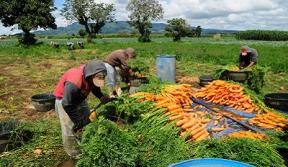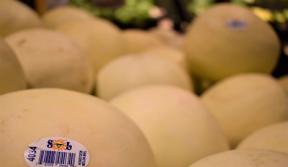U.S. consumers have grown more concerned about and aware of the conditions under which the goods they purchase are produced. This increased consciousness has lead to new models of production and consumption and a variety of alternative product labels with respect to environmental issues (e.g. Shade-Grown coffee), health (e.g. Organic bananas), animal treatment (e.g. Free-Range Chickens), and so on. Labels are intended to provide an easy way for consumers to know what products they can buy that reflect their values.
These trends are now being extended to working conditions and the treatment of workers. In large part as a result of campaigns and news stories about sweatshops in the maquila sector, child labor in the coffee and banana sector, slave labor in the cocoa sector, etc., companies have meanwhile become increasingly concerned about their "brand image" and wish to avoid negative media stories. Consequently, a number of programs have emerged that certify that a product is produced under acceptable conditions of work. The most prominent consumer-oriented social certification scheme in the U.S. is Fair Trade (see below).
USLEAP supports the premise that products that are produced under acceptable conditions of work, especially including respect for the basic rights and dignity of workers, should be identified as such in the market place for concerned consumers. Companies that treat their workers well should be rewarded in the marketplace over those that do not. Consumer power is a critical agent of social change in the global economy, but it extends well beyond the purchase of a labeled product. One danger of labeled products is that consumers may feel they have done their part by purchasing, say, Fair Trade coffee, while addressing the treatment of workers in the coffee sector takes more than this. USLEAP encourages consumers to practice a deeper level of engagement with the companies from which they purchase products. Just as a consumer might call or e-mail a company about a faulty product, consumers can contact companies with concerns about respect for the rights of workers who produced the product. Join USLEAP and support our corporate campaigns that seek to improve conditions and wages for workers abroad by supporting workers' own efforts improve their situation. The Fair Trade movement originated in Western Europe by small non-profit groups interested in improving the conditions of small coffee farmers. It has now expanded to other products and begun to evolve out of its origins as an "alternative" market into the mainstream. Fair Trade is a rapidly growing business, expanding its certification beyond traditional products like coffee and cocoa to bananas, pineapples, and flowers, with plans to at some point certify apparel. Fair Trade was founded to benefit disadvantaged small-scale producers. Products that are certified as Fair Trade are a guarantee that the producer, usually a small, independent producer with few workers or a cooperative, is paid a minimum price, regardless of fluctuations in the market. In recent years, as it has moved into new product areas and growing demand, Fair Trade has begun to certify banana plantations with up to hundreds of workers. Fair Trade has added new criteria for certification that includes how the workers are treated and respect for their basic rights but the expansion of the Fair Trade model to large-scale producers has raised concerns among the labor movement, particularly with banana unions in Latin America. These concerns include the adequacy of the monitoring, the relationship between unions and the establishment of "permanent committees" required by Fair Trade procedures, and use of funds provided to the committees. Fair Trade groups and the international union movement have begun a dialogue to address these issues. Long-time Fair Trade supporters have raised additional concerns, including opposition to certification of products marketed by transnational corporations (e.g. Chiquita bananas or Starbucks coffee) and whether Fair Trade has erred in moving beyond small-scale producers to large employers, e.g. banana plantations. USLEAP believes that when Fair Trade focuses on small farmers and cooperatives, it is generally complementary to efforts like those of USLEAP to improve conditions for workers on plantations and in factories. However, applying the Fair Trade model to workplaces that employ dozens or even hundreds of workers and go well beyond family or cooperative labor requires addressing and resolving a number of important issues. On the other hand, USLEAP believes there is great potential in linking the Fair Trade model to respect for worker rights. Banana unions, for example, are exploring how Fair Trade can be used to help stop the race to the bottom in their industry, which is threatening wages and good working conditions on many union plantations in Latin America. The most prominent Fair Trade label in the U.S. is the black-and-white scales of justice. In the U.S., this label is managed by Transfair USA, a member of a consortium of Fair Trade groups from other countries called the Fair Labeling Organizations (FLO) that controls the label globally. Organizations that promote Fair Trade in the U.S. include Transfair USA, Oxfam America, Coop America, and Global Exchange, among others. Other prominent certification programs that cover the treatment of workers include Rainforest Alliance and Social Accountability International's SA 8000 certification. These programs are used by major companies who are motivated in part by a desire to protect their brand name from negative media and campaigns. Rainforest Alliance is consumer-oriented, with a label; SA 8000 is not. In the apparel sector in particular, there are a number of certification schemes, social audit firms, and for-profit and non-profit groups that monitor and verify compliance with company codes of conduct. The Maquila Solidarity Network has prepared a comprehensive analysis of the various approaches, and provides periodic updates. Another analysis, focused more on the banana sector, was prepared for the 2004 International Banana Conference. While some certification programs are, in USLEAP's judgement, stronger than others, USLEAP is relatively agnostic on non-Fair Trade certification programs except to the degree that they provide additional opportunities to hold specific companies accountable. Generally speaking, certification programs have not yet demonstrated that they are effective enough to ensure protection for worker rights and justice for workers. Banana workers and their unions, for example, have been sharply critical of both Rainforest Alliance and SA 8000 certification of plantations where workers are reportedly denied their basic rights. And while certain conditions (e.g. health and safety) have improved in the apparel sector, the proliferation of codes, certification schemes, and monitors have not yet led to any significant improvement in wages or a reduction in the number of sweatshops in the apparel sector. The continued growth and expansion of certification programs, especially those that are not independent from business, have raised serious concerns from groups that seek an improvement in conditions for workers. Concerns include lack of transparency, inexperienced certifiers, and a tendency to undervalue or not even measure respect for some basic human rights. A fundamental concern is the danger that certification programs, codes of conduct, and voluntary compliance programs can and have been used to substitute for the need for a government to enforce international labor conventions and national law. On the positive side, the emergence of certification programs on the treatment of workers is a reflection of growing consumer concern and the effectiveness of activists who are demanding that companies treat their workers and those of their suppliers, at home or abroad, with respect, fairness, and dignity.
Fair Trade
Rainforest Alliance, SA 8000 and other initiatives

